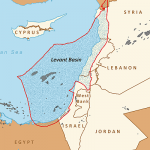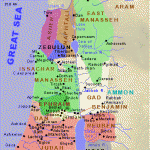Summary

Israeli Cuisine. young shanahan, CC BY. Enlarge
The word “kosher” comes from the Hebrew root Kaf-Shin-Reish, meaning “fit, proper or correct”. Usually it is used in the context of “fit to eat”. It defines foods (everything a Jew eats, not just meat) that are fit for consumption by a Jew by labeling foods as either “clean” or “unclean”. The biblical concept of clean and unclean animals occurs as early as Genesis 7:1-9, and the food laws are defined in detail in Leviticus 11 and Deuteronomy 14. Kosher can also describe ritual objects that are made in accordance with Jewish law and are fit for ritual use, link.
The image shows a typical meal in a Jerusalem restaurant, comprising falafel, hummus and Israeli salad.
Kosher constituted the basis of dietary regulations that are still adhered to by Orthodox Jews and by those Gentiles who are concerned with maintaining good physical health. Some Messianic Jews (Jews who see Yeshua as their true Messiah) also follow kosher and eat only “clean” foods, link.
Holiness: There is an even more important reason for kosher. The specific reason God gave the Israelites for forbidding them to eat any unclean animals, or even touching their carcasses, was to “be holy, for I am holy” (Leviticus 11:44-45). Here God does not distinguish between clean and unclean animals specifically for health’s sake, but for the sake of holiness. As an example, before Halal slaughtering the named of Allah is invoked, link, making halal meat unclean for religious Jews. Similarly, some Christians abstain from halal meat on the grounds of Acts 15:20 and 1 Cor 10:28.
Kashrut (pronounced: CASH-root)
The biblical commandments (Torah Kosher) regarding dietary practices are in fact quite simple. Scavengers of either land or sea are to be avoided, whilst mammals that both chew the cud and have hooves may be eaten. The consumption of blood is to be avoided. But Kashrut makes things more complicated!
Like Kosher, the term Kashrut also comes from the Hebrew root Kaf-Shin-Reish and refers to traditional or Rabbinical Kosher. It is more complex than biblical or Torah Kosher which is simply following biblical instructions. Kashrut Torah includes not only which animals can be consumed, but how they should be slaughtered, and how and when it is served. For example, all utensils used for the animals must be kosher.
Clean and Unclean Foods
Kosher Foods
According to the Torah, only certain kinds of animals are considered kosher. For land animals, any creature that both chews its cud and has cloven hooves is kosher (Leviticus 11:3). A cloven hoof is a hoof split into two toes. For creatures in rivers and seas, any fish that has both fins and scales is acceptable (Lev 11:9). For example, cod, haddock, salmon and trout are clean. Some insects are clean, such as the locust, the cricket and the grasshopper (Lev 11:21,22). Whilst not specifically mentioned, traditional Torah considers birds such as chicken, duck, geese and pheasant as kosher. Some see the distinction between clean and unclean birds is in what they eat; clean birds eat living things, not carrion, link.
Categories of Kosher foods: Today kosher foods are divided into three categories, meat, dairy and pareve. Meat must come from an animal that chews its cud and has split hooves e.g. cows, sheep, and goats (these animals generally eat grasses and grains that were also designed for food). All foods which are derived from, or contain milk are classified as dairy e.g. milk, butter, yoghurt, and cheese. Pareve are foods that are neither meat nor dairy, such as eggs, fish, fruit, vegetables, grains, pasta, coffee, and tea, link.
Non-kosher Foods
Any land animal that chews the cud but does not have cloven hoof, or vice versa, is unclean. A pig has cloven hoofs but does not chew the cud, whilst a hare chews the cud but does not have cloven hoofs; both are unclean (Lev 11:6,7). Similarly, any water creature that does not have both fins and scales is unclean (Lev 11:10). For example, shrimps, crabs, shark and swordfish are unclean. Deuteronomy 14 describes many birds and insects that are unclean and cannot be eaten, as in the buzzard, raven and seagull (well-known scavengers).
Rabbinical Kosher
As already mentioned, Rabbinical kosher is more complex than Torah kosher and specifies how an animal should be slaughtered, and how and when it is served. Rabbinical Kosher slaughtering is claimed to be more humane than non-kosher methods in that the animal does not feel pain, link. It is also much more sanitary. A very sharp blade is used to cut the windpipe, oesophagus and the major blood vessels in the neck with one uninterrupted stroke. Proponents say this causes an instant drop in blood pressure in the head, leading to rapid loss of consciousness and insensibility to pain. The bleed-out of the carcass is particularly important as Jewish law forbids adherents to consume blood (Lev 17:13-14).
Secular Law: Kosher slaughtering claims are disputed by some EU countries, who insist that all animals must first be stunned, link, link. Unfortunately, Kosher slaughter forbids stunning and so these new laws have caused kosher meat plants to close in parts of Belgium, for example. In England, an animal must be stunned before being killed unless it is religiously slaughtered, as for kosher meat.
Rabbis use the term “trayf” for any form of non-kosher food, link. The word is derived from the Hebrew “terēfáh”, which refers to an animal which suffered specific injuries. Trayf actually means “torn” or “shredded”. For example, animals which are kosher become trayf, if during the process of slaughtering, the slaughter knife becomes nicked which would tear the flesh. The Torah forbids eating animals whose flesh has been torn (Leviticus 17:15). Rabbis extend this concept to anything that is “out of place”. For example, an event that contaminates a kosher food, like cutting clean meats with the same utensils used to cut unclean meats, link.
Kosher and Health
At first glance the Torah appears to provide no specific reason why the Hebrews were given the food laws in Leviticus 11. Why are some creatures declared clean and some unclean? But what we do know is that all living things have a purpose. The pig eats the dead and the filth of the land. Likewise, the shrimp, crab, clam and similar water creatures keep the waters clean. And birds like seagulls, buzzards and vultures are scavengers from the air, feeding on carrion, dead plant material, or refuse. All these creatures are described as “unclean”, but clearly they have a cleansing purpose. Not surprisingly, God also declared someone who touched the carcass of a dead creature to be unclean until evening (Lev 11:24).
Modern Discoveries support Kosher Laws
As medical science has advanced, it is now clear that the food laws have a health benefit, link. For example, the Israelites were commanded to avoid eating animal fat or blood (Lev 3:17) – as a perpetual statute. Now modern science has discovered that animal fat is bad for us since heart disease is most commonly caused by fat deposits that build up in the arteries.
In their book None of these Diseases, Drs. McMillen and Stern show how to obtain extraordinary medical benefits simply by heeding the Word of God. Diligently following the Levitical laws does indeed have health benefits for modern man, just as God promised the Israelites in the Exodus:
If you diligently heed the voice of the Lord your God and do what is right in His sight, give ear to His commandments and keep all His statutes, I will put none of the diseases on you which I have brought on the Egyptians. For I am the Lord who heals you (Exod 15:26).
For example, even though horses and rabbits are consumed in some countries, they do not have split hooves and so are biblically unclean. We now know that horse meat often contains viruses and parasites, and rabbits are the cause of tularemia (an infectious disease) in humans. It was only discovered in the late 1800’s that animals carry diseases dangerous to man. A modern-day example is coronavirus (Covid-19) that is thought to have spread from bats, via an animal, to man. Bats are thought to be the natural host of the Ebola virus, rabies, SARS and MERS, with the latter two both coronaviruses similar to the one that emerged in Wuhan [CNN, 29-01-20].
Shellfish: Shellfish can be placed in a body of water that is contaminated with cholera bacteria, and they will purify the water. Shrimp, oysters, crab, scallops and mussels are particularly efficient at this. They filter large volumes of water every day. Sewage laden with chemicals, toxins and harmful bacteria, parasites and viruses become concentrated in those shellfish [Rex Russell, M.D.].
Pigs: These are of course well-known for being non-kosher. Why? Because pigs are scavengers, eating for example garbage, feces, and even decaying flesh. And because of their gluttony (over-eating), parasites, bacteria, viruses and toxins can pass into the pig’s flesh. So eating pork can result in toxins and infectious agents being passed on to humans, Rex Russell, M.D.. The toxins are held especially in the fat, which is dispersed throughout the meat and so cannot be separated, Colbert, M.D.. Pork products, particularly liver, frequently carry hepatitis E, which can cause severe complications and even death in vulnerable populations. Thorough cooking is necessary to deactivate the virus, link. In his book, Russell comments:
Scripture and medical research agree that modern lifestyles lived without reference to God’s laws and design shorten life and hasten death.
Kosher Laws: a Spiritual lesson for the Hebrews
Besides the clear role of kosher for health reasons, there is also a deep biblical reason. In fact, some claim that the kosher laws are not premised on bodily health at all, link. Rather, God introduced the concept of “clean” and “unclean” to the Hebrew people to remind them to be spiritually holy before Him:
You shall not make yourselves abominable with any creeping thing that creeps; nor shall you make yourselves unclean with them, lest you be defiled by them. For I am the Lord your God. You shall therefore consecrate yourselves, and you shall be holy; for I am holy … (Lev 11:43-44)

Israeli fruit. Enlarge
So kosher laws taught God’s people to not only make a distinction between what is clean and unclean, but to differentiate between what is holy and unholy. Alongside social laws, kosher laws constituted a sophisticated object lesson for the Hebrews. They were intended to teach about separation and holiness, so preserving the Messianic line in preparation for the birth of Yeshua (Jesus). Together, the social and kosher laws were, and still are, intended to preserve both the Messianic line and the moral purity of the nation of Israel. Similarly, the extra rabbinical requirements for kosher purposefully sought to socially preserve the religious sanctity of the Jewish home. Of course – you can always eat Israeli fruit instead!
To extend this teaching, we can use the following analogy, link:
- Unclean animals represented pagan nations around the Hebrews
- Clean animals represented the Hebrew nation
- The sacrificial animals represented the priests
Clearly, God used food to illustrate the spiritual separation between God’s chosen people and pagan Gentile nations.
Did Jesus keep Kosher?
Yes. Yeshua, a Jew, lived in a Jewish culture in which there was little choice other than to keep biblical kosher i.e. the dietary laws as given in the Torah. There was no option during Jesus’ time; they all kept kosher, link. Yeshua’s point of contention was never with the Torah, but with Rabbinical kosher or Kashrut. He disputed with the scribes and Pharisees who held to the “tradition of the elders” i.e. Kashrut (Mat 15:1-20). To counter their arguments Yeshua said:
Do not think that I came to destroy the Law (the Torah) or the Prophets. I did not come to destroy but to fulfill – (you are) teaching as doctrines the commandments of men (Mat 5:17; 15:9)
If Yeshua had not kept Torah kosher it would have been used against Him at His trial; but it was not. So, yes, Yeshua kept kosher.
Messianic Jews today: That said, some argue that, because Yeshua kept biblical kosher, this does not mandate Messianic Jews to keep kosher, link. Paul argued that “there is nothing unclean in itself” (Rom 14:14), but sometimes the believing Jews should keep kosher in order not to be a stumbling block to weaker brethren (Rom 14:14-23). Paul’s main point was to win Jews under the law to Yeshua (1 Cor 9:19-23).
Are Kosher laws for Christians?
Orthodox Jews argue that since the kosher laws were given specifically to the Hebrew nation (to remind them to be “holy” before their God), then kosher does not apply to Gentiles. They maintain that kosher is strictly part of the Israelites’ particular path to holiness, link, and Christians are not bound by the dietary restrictions in Leviticus 11, link.
So why should Gentile believers try to keep the food laws that were given specifically to the Jewish people under Moses? After all, the NT says believers are no longer under the law. Let’s look at this reasoning first.
1. Christians are under Grace, not the Law, aren’t they?
Today, the traditional view is that the kosher laws are not applicable to the Church. It is pointed out that the Jewish leaders of the early church simply settled on three recommendations for Gentile believers, link: to abstain from things polluted by idols, from things strangled, and from blood (Acts 15:19,20). Today, believers have died with Christ, and those who have died are not bound by the Law, link. To quote Paul:
For sin shall not be master over you, for you are not under law, but under grace (Rom 6:14)
But what law is Paul referring to? The Ten Commandments are essentially a summary of the entire Old Testament law. Apart from the fourth commandment (remembering the Sabbath day), the other nine commandments are repeated in the New Testament, and the greatest of these is to love God (Mat 22:37-38). Now loving God means keeping His word (Jn 14:23), and Leviticus 11 is God’s word. As we have seen, the food laws were given to Israel as a daily reminder to be holy, and they did this by avoiding things not designed by God for human consumption. So why shouldn’t the church follow the same wisdom? If the church rejects God’s words of wisdom, is she still loving God?
That said, most Christians still reject kosher and quote well-known NT texts in their defense.
Texts used by Christians to reject Kosher laws
There are a number of NT texts which (appear to) say that no foods are unclean:
Do you not perceive that whatever enters a man from outside cannot defile him, because it doesn’t go into his heart but into his stomach, and then out of his body [thus purifying all foods]” (Mark 7:18-19)
A voice came to him, “Get up, Peter, kill and eat!” But Peter said, “By no means, Lord, for I have never eaten anything unholy and unclean.” Again a voice came to him a second time, “What God has cleansed, no longer consider unholy” (Acts 10:13-15)
One believes he may eat all things … I know and am convinced in the Lord Jesus that nothing is unclean in itself; but to him who thinks anything to be unclean, to him it is unclean. (Rom 14:2,14)
No one is to act as your judge in regard to food or drink … why, as though living in the world, do you submit yourself to regulations – “Do not handle, do not taste, do not touch!” (Col 2:16,20,21)
But the Spirit explicitly says that in later times some will … advocate abstaining from foods which God has created … For everything created by God is good, and nothing is to be rejected if it is received with gratitude; for it is sanctified by means of the word of God and prayer (1 Tim 4:1-5)
Christians use these scriptures to reject the need to observe kosher and see it as solely for religious Jews.
1 Cor 10:28:27-28: In Paul’s time most meat sold in the markets had already been dedicated to a pagan god. If the believers knew with certainty that it had been so dedicated, Paul advised against eating it in order to demonstrate that they did not worship idols. Otherwise they should eat with a clear conscience. Today, the same goes for meat in India offered to a Hindu god, or halal food dedicated to the god of Islam (Allah). It is the endorsement of the pagan religion that is the problem, not the food.
The Real Meaning of the above Texts
It is worth revisiting the NT texts just highlighted since invariably they are taken out of context:
Mark 7:18-19: Was Jesus really abolishing Kosher observance for the Jews? To put chapter 7 into context, Jesus was really teaching about the custom of hand washing (v2); not the Torah of God. Also, in the most prominent modern Critical text (NU), the text in brackets is understood to be Mark’s comment that Jesus was declaring all foods clean.
Acts 10:13-15: Many Bible commentators understand that God was using symbolism here in order to make a point. They maintain that the unclean or common animals in the vision symbolized Gentiles, and Peter’s vision was not a New Testament certification for the eating of previously declared unclean foods, link. As Peter eventually realized, all believers in Christ, Gentile or believing Jew, are clean in God’s sight (Acts 10:28). Kosher was not the issue here. After all, why would God suddenly cancel the Levitical laws for Peter (a Jew) and not inform other Jewish believers?
Rom 14:2,14: Taking the whole chapter, Paul is really discussing whether it is acceptable for a believer to eat meat at all, since meat had often been offered to idols in a pagan temple (1 Cor 8:1). Paul is referring to the eating practice of vegetarianism, not kosher. Where there was uncertainty as to the meat’s history, the weaker brethren ate just vegetables (v2), presumably to “play safe”, link. They were not weak for keeping kosher. Paul concludes “eat whatever is sold in the meat market, but avoid it if you know it has been offered to idols” (1 Cor 10:25-28). Again, Kosher was not really being discussed in Romans 14.
Col 2:16-23: Here Paul is really asking believers to avoid legalism and look instead to Christ. He asks why are they following the self-imposed commandments and doctrines of men (v22) – as found in the complex regulations of Kashrut for example. When it came to food, Paul’s implication is that they should adhere to the relatively straightforward commandments of God, as found in Leviticus 11 and Deuteronomy 14.
1 Tim 4:1-5: Here Paul argues that it is wrong to abstain from foods which God created, for every creature of God is good. What does Paul mean by the term “every”? Remember that God told Adam that he was free to eat of every tree of the garden of Eden (Gen 2:16). But in the next verse there is a caveat: Adam was forbidden to eat of the tree of the knowledge of good and evil. To see the proper context of the adjective “every” here we need to look at verse 9. The tree of the knowledge of good and evil was not part of the trees declared “good for food”.
Similarly, upon leaving the Ark, God told Noah that every moving thing that lives could be eaten (Gen 9:3). Did this mean that Noah could now eat the offspring of the animals God had previously declared to him as unclean (Gen 7:2)? Was Noah now permitted to consume snails and mice and sit down to roast pig – creatures declared as unclean in Lev 11 and Deut 14?
As in Adam’s case, we must not take a word out of context. Both Adam and Noah could eat everything that God had declared to be good for food. But not all things had been declared “good for food”.
So Paul’s listeners were really being encouraged to differentiate between clean and unclean meat, not to abstain altogether, link. Clearly, we must be careful not to read NT scriptures out of context. None of the above texts are discouraging Christians from trying to follow biblical kosher.
2. Reasons why Christians should try to follow Biblical Kosher
Here biblical or Torah kosher is under discussion, not Rabbinical or Kashrut kosher. As we have seen, NT texts used to reject kosher laws are usually taken out of context and misused. Moreover, as discussed, a sign that Christians love God is if they keep His word. Consider:
All Scripture is inspired by God and profitable for teaching, for reproof, for correction, for training in righteousness … for whatever things were written before were written for our learning … (2 Tim 3:16, Rom 15:4)
Early Church Teaching: In these texts Paul is pointing us to all the Hebrew scriptures, including the Torah (bear in mind there was no written NT). Timothy was not raised as a Jew and was likely converted to the Christian faith on Paul’s first missionary journey. As the younger man, he would have received his authority to preach in churches directly from Paul. So here, Paul was encouraging a new Christian and member of the early church to teach on all the inspired Hebrew scriptures. Undoubtedly, amongst his teaching Timothy must have upheld the Levitical food laws or he would have been in conflict with inspired scripture, and with the fact that Jesus followed kosher. So why has the church moved away from such teaching?
The Jewish Root of the Church: In Romans 11 Paul makes it clear that the Church is like a “wild olive branch”, grafted into Israel’s Olive Tree. So the true church is historically and spiritually connected to the Hebrew nation and God’s laws recorded in the Torah. Why then does the church ignore God’s food laws?
Furthermore, all trees begin from a root, and in Romans 11.16 we read of a holy root. This can be nothing less than a symbol for the one holy and eternal Creator God. So any branches of this tree must be holy since the root and the trunk are holy. Now recall that God used the concept of clean and unclean foods to repeatedly remind Israel of their need to be holy before Him. Likewise, the church is instructed to be holy before God (1 Pet 1:16), and the adoption of kosher laws would remind her of this.
Kosher in the Future: According to Bible prophecy, the world (Jew and Gentile alike) will adhere to the Hebrew scriptures in the (soon coming) Millennial age. For example, worship will be on the true Hebrew Sabbath (Isa 66:23), Hebrew will be the prominent language of Israel (Isa 19:18, Zeph 3:9), and nations will go up to Jerusalem to keep Jewish Feasts and worship Christ, the King (Zech 14:16). In those days, every cooking pot in Jerusalem will be declared holy to the LORD (Zech 14:21), which implies there will be no unclean food in the pot! Torah kosher will surely be observed.
Conclusion
Today’s institutionalized church invariably ignores her Hebraic background and adopts pagan concepts like Replacement Theology and Sunday worship. These beliefs and acts do not have Hebraic roots, and so it is not surprising that the Church also rejects biblical kosher (clean and unclean foods) and the consequent daily prompting to be holy. In particular, Christians often misinterpret NT texts when claiming that all things are clean and fit to eat.
In order to please God, the Church should remember her Hebraic roots and acknowledge that she has moved away from Hebraic truths – and that must include what God declared good and not good to eat! Recall that as they entered Canaan the Hebrews were commanded to fear the LORD their God and to keep all His statutes and His commandments (which included the food laws). In return God promised that their days would be prolonged (Deut 6:2), which implies good health!
Christians also fear the LORD (as in awe for Him) and keep His law (as written on their hearts). So in return it seems that by trying to adhere to His wisdom on food, they can expect a long and healthy life, see Modern Discoveries. God didn’t change His mind regarding healthy and unhealthy foods between the Old and New Testaments! Unclean animals have a purpose – to cleanse land and waters as scavengers. But biblically, and according to modern science, generally they are not good to eat!
Who follows Kosher today?
Today kosher is a way of life for Orthodox Jews since they follow the Torah, but only some Messianic Jews observe kosher, link. In fact, today, keeping kosher is an option for most Jews and only 8% of kosher consumers are actually religious Jews, link.
On the other hand, kosher has gone global and has become increasingly popular during recent years. For example, although only 2% of Americans are Jewish, over 40% of all packaged food in the US is certified kosher, link. Why is kosher so popular? It is perhaps because kosher is primarily seen, not as a type or style of food; rather it refers to the ingredients, preparation process and inspection of the foods. Kosher foods are highly beneficial because of the strict rules under which they are produced, and because of the close inspection and monitoring that certification requires. For instance, kosher gives an assurance that a product does not include potential allergens such as shellfish. So today, most kosher consumers appear to choose kosher for health and food safety reasons.

































